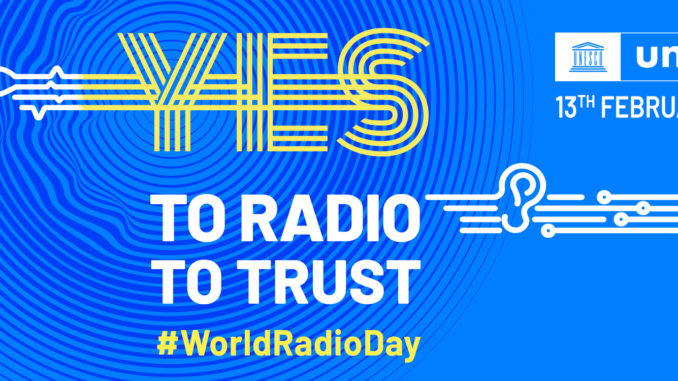
UNESCO calls on all radio stations to celebrate the eleventh edition of World Radio Day,under the theme “Radio and Trust“, on February 13.
Proclaimed in 2011 by the Member States of UNESCO, and adopted by the United Nations General Assembly in 2012 as an International Day, February 13 became World Radio Day (WRD).
Building on more than a century of its history, radio remains one of the most trusted and widely used media.
Throughout the years, radio has provided quick and affordable access to information in real time and professional coverage about matters of public interest, as well as guaranteed distance education and entertainment.
Bridging between traditional and state-of-the art technologies, radio now offers a variety of content through different devices and formats, such as podcasts and multimedia websites.
Still, not all world citizens believe they get the information they need. Recent world events and the Covid-19 pandemic have eroded trust in the media in general, fuelled by the circulation of false content rapidly spreading on social media.
The resulting financial constrains that forced reduction of staff and the loss of advertisement to Internet companies have accelerated declines in news media revenue, including for radio, and raised the costs of verified information, particularly for local radio outlets.
This year’s subthemes for World Radio Day
Trust in radio journalism: Produce independent and high-quality content
Respecting basic standards of ethical journalism has become challenging in the present high- tempo digital age. However, in order to keep or raise listeners’ trust, journalism must continue to be based on verifiable information that is shared in the public interest, holds the powerful to account and helps society build a better future for all.
In this context, editorial independence is essential, as it may show the ability of radio stations to bring news free of influence. Moreover, the understanding of digital technologies and social platforms is key to avoid circulation of unverified information. Investing in fact-checking, investigative journalism and rigorous verification of sources and content are some of the practices radio broadcasters could strengthen to keep audience trust.
An informed audience equipped with Media and Information Literacy competencies is also necessary, so that listeners discover, consume, and respond critically to content, and thereby appreciate the quality journalism that the radio station is bringing to them. More and more radio stations are therefore including media and information literacy shows in their programming schedule.
Trust and accessibility: Take care of your audience
Gaining listeners’ trust implies conveying diversity in all its forms: staff origins, information sources, formats, distribution channels, programming, editorial content, etc. People who feel represented and can access information that is relevant to them may become loyal listeners.
However, reaching out to a selected audience group implies serving the informational needs of all listeners and being a catalyst for integration and social participation – including persons with disabilities. Digital radio platforms provide grounds for innovation in the accessibility of content for the latter, such as the use of sign languages or automated subtitles for hearing-impaired audience when streaming, or announcements of content for blind listeners.
Furthermore, voice being the main communication resource in radio, stations with the ability to recruit personnel with disabilities, for example blind radio hosts, could let it be known. Their experience could be inspirational for listeners.
In terms of diversity, participatory radio such as community radio is likewise important to ensure that communities of interest, especially hard-to-reach, under-represented or diaspora groups, do not feel at the margins of news making and can credit radio with their confidence.
Trust and viability of radio stations: Ensure competitiveness
How can radio survive when financial crisis hits the media market? How to transform loyal audience engagement into financial sustainability?
This sub-theme links the economic survival of radio stations to their ability to attract and retain a large enough base of loyal listeners to be sustainable or to embed listener interaction into their business models.
Most radio stations are small or medium enterprises, when not totally non-profit, and find themselves in dire situation. Even public service broadcasting is facing license fee cut plans and reticence from citizens to pay audio-visual taxes in times of streaming services and Web radio when they can access content otherwise.
New funding models are to be researched and discussed, for instance subscriptions, membership models, pay-per-listened content, very local advertisement and other.
